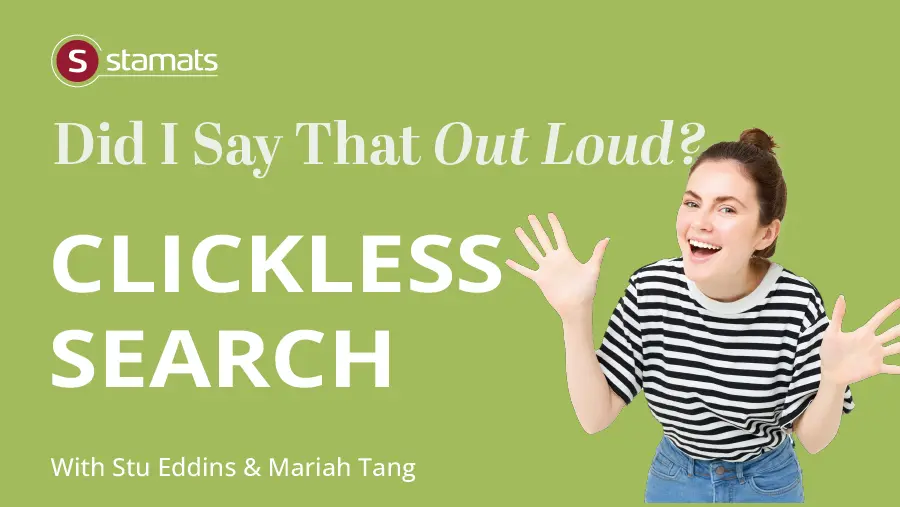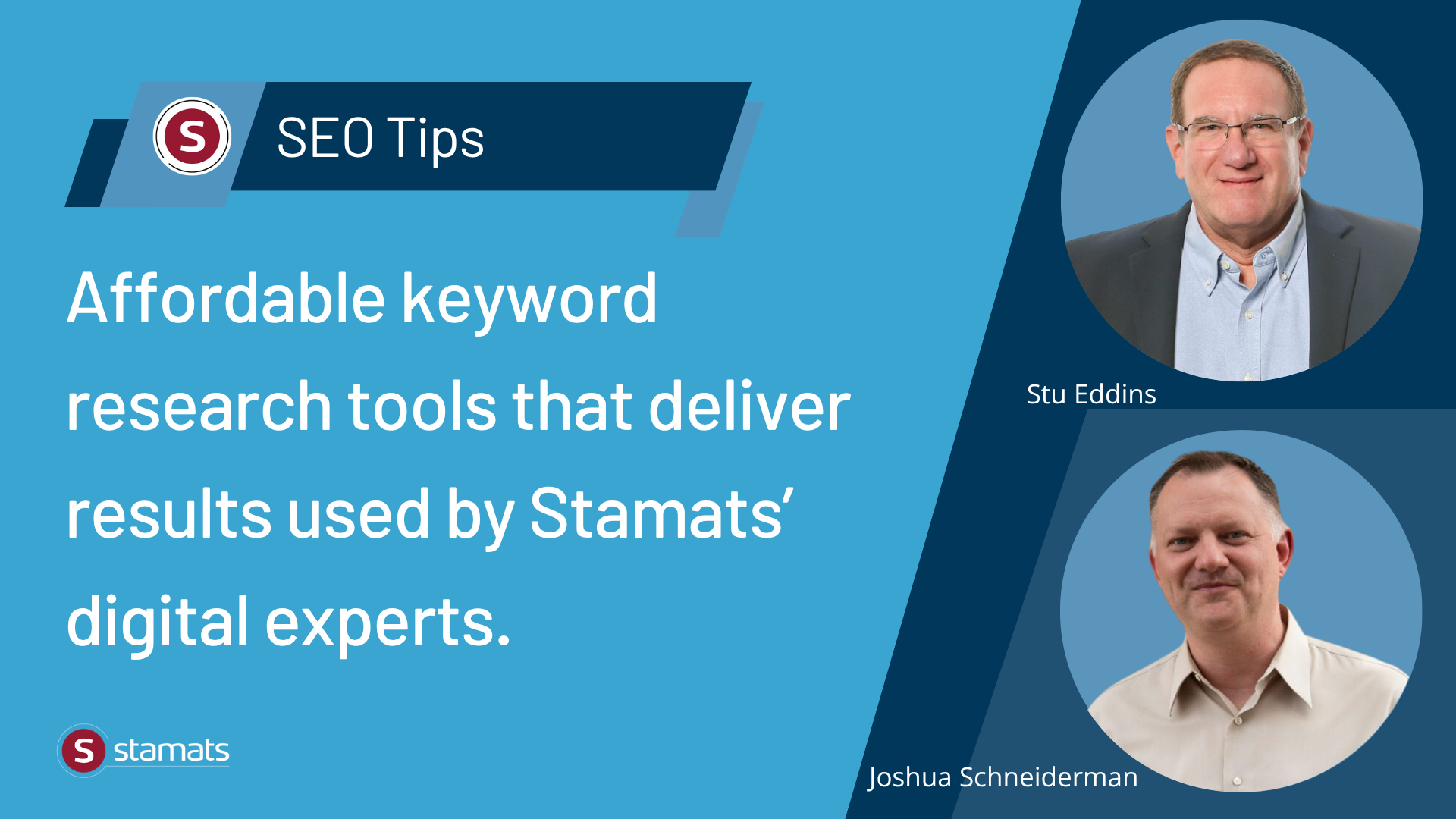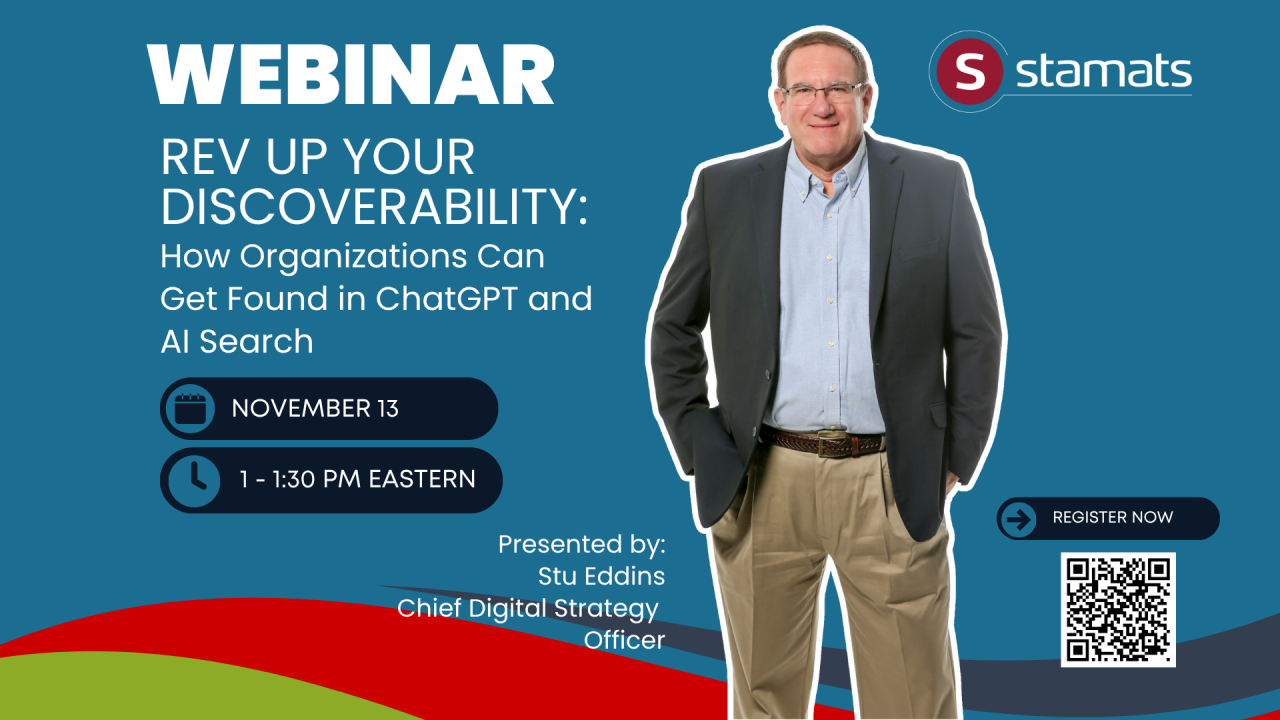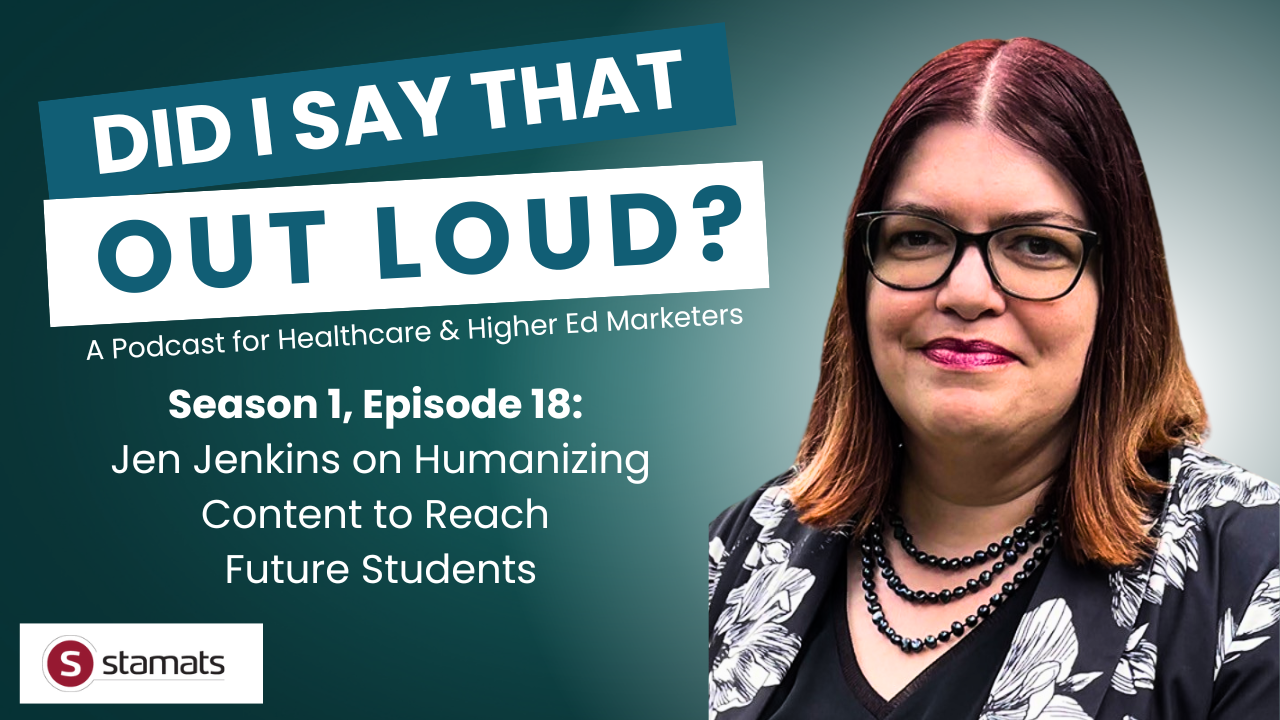Written by
on
In a world where search no longer requires a click, will your brand’s organic content be strong enough to survive? Stu and Mariah drop the mic on what to do—and what not to do—as we enter our Clickless Search Era.

Sep 27th, 2024
Season 1, Episode 11
In a world where search no longer requires a click, will your brand’s organic content be strong enough to survive? Stu and Mariah drop the mic on what to do—and what not to do—as we enter our Clickless Search Era.
Listen to Episode
Transcript
Mariah Tang: Did I say that out loud? Welcome to “Did I Say that Out Loud?”, a podcast where Stu Eddins and Mariah Tang reflect on agency life and answer questions from our higher ed and healthcare clients about the latest in digital marketing, content and SEO.
Stu Eddins: This podcast is going to be on a recent article. It’s made headlines in things like Search Engine Land and places. A study said 60% of searches result in no clicks.
Mariah Tang: We’ll put the link in the show notes.
Stu Eddins: Now they’re quoting another source, and it was a study that was done that said when a certain people search on Google in particular, but any search engine anymore, six out of 10 times there’s no click out to the wild web to find more information.
Mariah Tang: That blows my mind as a as a writer, as a journalist, as a content strategist, like you’re just going to take for face value what you see on the web?
Stu Eddins: Well, let’s also remember that a significant percentage they don’t really describe that, but a significant percentage isn’t that they read something and left is that they research, they do their search again because the results weren’t quite what they were expecting.
Mariah Tang: Oh, yeah, okay, that makes sense.
Stu Eddins: Yeah. I used to refer to this is the magic eight ball. I ask a question, I don’t get the answer I want. I ask it a different way, until I get the answer I’m looking for. You know, how many times have you have you picked up a magic eight ball? Give it a shake, turn it over, and says the answer is not clear at this point. So he said, Yep, hell no, yes, you’re right. It’s going to happen. So, yeah, in some respects, search is treated just like that magic eight ball. That’s a simplification.
Mariah Tang: People have gotten much, much better at search, and search has gotten better at intention.
Stu Eddins: Yes, because search is more than just the words you type in search is also the accumulation of all the things you did leading up to that point. I had a recent experience and little off track here. I had a recent experience where I had been looking for ice cream recipes. I got an ice cream maker for Father’s Day, and I thought, Oh, that’s cool. So I started looking for ice cream recipes. And I did that for just a little while, and then I was asked to come up with a dessert for a fourth of July event. And so I typed in ideas for Fourth of July event, all of them were ice cream, because for days before that, that had been what I’ve been looking for. Eventually you scroll down far enough you start getting apple pie and all the other fun stuff.
But search is also based on your performance in your recent history. However, 60% of search does not result in a click. Yes, that’s true, but the click is, in this case, click, really non Google property, a click from search that goes to your YouTube channel is a property, and yet it’s content you posted. So you really care whether that click went to YouTube or to your website, as long as you were the feature there. That that’s not a huge percentage. It is a percentage, but it’s not like, you know, half of the of these non click searches. It’s not like that, or it’s a click on the map. Because what I was looking for was directions to and and fill in the blank. And what came up was a result in my click was onto the Google map to find the direction. Do you really care that people aren’t first clicking your link, going to your homepage, scrolling to the bottom of the page, and clicking your address with directions. Right? This inconvenient.
Why would you want to put your perspective client or customer through that? And that’s why you go through all those steps to make sure your Google or whatever search engine properties are set up. Yeah, the way they should be. It’s quite important that we acknowledge that this has been going on for some time. Clickless search is something that I actually report on in analytics now. It’s not the entirety of all search, click List search, rather, in this regard, what I’m talking about is when people click on the Knowledge Graph. That’s considered a clickless search too. So if I search for, you know, Mariah is dry cleaners, and it comes up with you on at the top of search, but there’s this Knowledge Graph thing on the right hand side of desktop, or at the top in mobile, and I scroll through that there’s all this information about it, and I wind up clicking on the map to find out how to get to you. That’s still considered click with a search, because I stayed within the Google domain.
Mariah Tang: Gotcha.
Stu Eddins: Bing has the same thing. Yahoo, who cares? I don’t think anybody really uses that much anymore, though they’re there. Yeah, so click the Search has been around for a very long time. It’s increasing. And if you think about it, when you add in the AI overviews we’re going to get, we could expect an even greater increase in click List behavior. Now hold that thought for just a moment. Talk about AI overviews of this in just a few moments. The thing is, don’t just pay attention to how many clicks you don’t get. Pay attention to the ones you do. And I did. I did a quick sample of 15 different websites that we have analytics asset access to, not all of them. Just randomly pick 15, and every one of them, over the last four years has shown a consistent increase in organic search traffic coming to their website. So the volume of click the search is increasing, but then so is the volume of clicked search. Now one thing I did not find in the article, and I have to reread it again and go through with a little finer tooth comb, Voice Search is in those statistics as well, I believe. And there’s no click after a voice search. If I say, Oh, I’m not going to say it, because I’ll turn my phone on Google. Give Me a tell me about this, that and the other thing, it’s part of the statistical database they have. And of course, there’s no click from that when Google reads it back to me. The same thing for big let’s remember that Bing is currently what’s being used by the Alexa devices that people have in their homes. So when you ask a question of Alexa, is that incrementing that number in Bing that they’re using to say 60% I think so, but I don’t see one way or another, regardless, the 60% number is the is the catchy headline to the limits of their test, it’s factual. We can just simply accept that.
But the other part about it is we also have to acknowledge that beyond the headline, there’s always been clickless activity. Ever since Google started putting a knowledge graph in referencing maps, started sending people to YouTube channels, there’s always been this, this clickless behavior that’s out there.
Ai overviews, hold that thought. So let’s return to that for a moment. I guess. Yeah, AI overviews, they were released into the general US market about a month and a half ago or so. They’re showing up for 7% or less of searches right now, far less than anybody anticipated. No idea what Google anticipated with this. Now, they’re not very forthcoming, but yes, AI overviews could contribute more to clickless search, but at the same time, it’s not been a significant percentage of searches that get it, I do find it interesting that that now they’re testing the this kind of scroll across the bottom where it’s like, here’s three, here’s three sets that you might find more information on. Yeah, kind of thing, instead of just here’s the answer. I’m not going to tell you where we got it right, right? And that was one of the criticisms of Google’s AI original Bard, as it was called. It gave you all sorts of information, but no citations. Chatgpt gave you citations, but it was just hyperlinks within, either within the content or as hyperlinks of URLs. And if the citation site didn’t have plain language URLs. It was just alphabet soup.
Mariah Tang: Straight plagiarized soup. Yeah, yeah, not jaded at all.
Stu Eddins: No, no, no, as the content person says. Yeah, I guess it is your content being sucked up by AI overview. So you may have a little more skin in the game than I do but AI overviews are not having a significant impact yet. Google is becoming, well, not just Google, all search, you can say it’s about Facebook or searching, searching on Tiktok, search has stopped being a link provider started being an answer provider. Google’s client is the person doing the search, not you and your website, not me and your ads, not Google’s client is the person doing the search. The more they can satisfy that person, the more the further they’re going to lean into that behavior that did the satisfaction, that generated the satisfaction. People are saying, I want to live in the world of Star Trek. I asked the computer a question. I get one answer and I’m done. That’s the direction. Even Sergey Brin said the same quote of the same thing. Early on in Google’s life, but that was the ultimate goal. He even cited the Star Trek computer as one question, one answer, we’re good to go as being kind of the goal of Google at some point.
Unfortunately, search is transactional. At this point, there’s a reason for search to exist in its current paradigm, because I want my site to be found before yours is Mariah. I want more clicks than you get. I want my ads to be clicked before yours are. There’s this transactional competitiveness going on in search right now, and it generates, I don’t know, I think the technical term is buttload of money when you look at Google’s, I believe was two $19 billion revenue last year, and 80% of that came from ad clicks. Yeah, I’ll fact check my 80% but I believe that’s what I read. In other words, still, most of that money came from ad clicks. They have a vested interest in making sure that search remains competitive and viable for advertising. It may take somebody challenging that paradigm and saying, You know what? Search is a utility. We are going to give you one answer to your to your question, and it’s going to be the best answer possible. And we’ll get our money from some other way. That other way will probably be, in my opinion, for subscription.
Instead of a free tool, you’re going to pay all dollars a month to use it or something. Anyway, people do for YouTube, people do for Spotify, yeah, you know, free, ad free, and in fact, chat GPT, their 4.0 version. If you want that, I think it’s the pro version is fee per month, and that gives you not just better results. It gives you richer responses, as far as making the citations more readily available, as far as tailoring the response length, what they’re expecting and so on.
The model of a for-fee search engine, or answer engine, if you will, is already there. I believe they’re testing it. We’re getting pretty far away from 60% of searches don’t result in a click. However, that’s what we’re leading to it. Consumers are are giving indications that they just want answers to some things they don’t need to be led to someplace to get the same answer. They want to ask a question and get an answer right here and now.
And this is pushing them toward being answer engines instead of search engines. Yeah. So what is what do you think Stu that this means for marketers, the thing that we have to do is you have to look elsewhere in Google search if you want to optimize your experience, excuse me, not always your experience, but optimize the traffic to your website. First off, you should never have been counting totally on Google search. You need to be considering that your job in organic traffic is organic, social, organic search. You need to make sure that you have such things as guest blogging, anything you can think of that contributes traffic to your website without a fee necessarily is going to become organic traffic.
Maybe labeled referral may be labeled anything else, but it’s non paid traffic. Another article, I think, that came out after this 60% search results, and I think it’s even mentioned in the article, there are several other places you need to be active in to make sure that your website is getting, is developing traffic that isn’t that you don’t pay for. And that’s true. You don’t just, you know, place your bet all in one horse. Make sure that you have yourself covered across the spectrum of discoverability, if you will.
So did you say there were seven? I think that’s what the article said. Was that there were seven here. I just opened up. Let’s take a look here real quick. Google launched AI, or we use it may and well, yeah, here it is, search everywhere optimization, seven platforms SEOs need to optimize for, beyond Google.
And the thing that they’re talking about is, what is search everywhere optimization? And they talk about a number of different places you need to make sure optimizing social, for example, Tiktok, optimizing for things such as Snapchat, because you’ve discussed this before, if you’re under the age of me, The lower 30s, you probably turn to Tiktok for answers more than you do Google.
Mariah Tang: Yep, I know all of my teenagers do.
Stu Eddins: Yeah, my own daughter does, and she’s not a teenager. She about has one of her own. She goes to Snapchat and Tiktok to find out information more than she turns to Google. This has to do with preference, more than anything else, answer quality, who knows, the people who do this would prefer to get information from somebody who’s used it rather than an answer provided from the source that they’re going to get the solution from. So, yeah, 60% of clicks no longer, uh, excuse me, 60% of searches no longer result in a click. You got it, they don’t to me that that speaks a lot to discussing the experience around your service or your project or your product, not just here’s the thing we have that’s just not going to fly anymore, whether it’s on social or Google or whatever platform. Yeah, and we could consider this to be the warning shot across the bow.
And how slow this evolution happens, I don’t know. I expect it to be much more accelerated with some of the other features that have been added into Google. I think that the pace of adoption of AI into Google, answer machine, versus answer Engine versus search engine, I think it’s gonna be much more fast paced than we’re probably anticipating at the moment, because Google’s client is the search user. That’s who they want to satisfy. People are saying this at the top of their lungs.
Yeah. So I I’m not surprised by the number. I think there’s a lot of explanation around the number, but I don’t think it’s going to change. I think we’re going to see more and more clickless behavior going on. And yeah, our organic traffic is generally increasing across websites. What about the ones that don’t come to the website? Are they getting the information that we want them to get? Are they getting it from us?
The way to assure those two things is by having a multipronged attack, or optimization attack, that multi prong optimization plan that has your presence on Tiktok, that has your presence at Google and other organic search, that has your presence across multiple sources, so that you’re driving not just general traffic, but meaningful traffic to the website. Yeah, into very into Google.
Google doesn’t see how many searches are conducted every day. There’s maybe eight and a half billion searches every day. About Google is saying is, we have access to eight, eight and a half million searches every day. Advertiser, we’ll rent you access to that, but you’ll have to compete against others to bid, then whoever’s willing to pay the most for that access gets it.
Mariah Tang: How many billions of those do you think are from us, Stu?
Stu Eddins: I’m thinking about half.
Mariah Tang: Thanks for listening to “Did I Say That Out Loud?” with Stu Eddins and Mariah Tang. Check out the show notes for more information about today’s episode. And if you have any questions, concerns or comments, hit us up anytime at stamats.com.
Let’s talk
You have questions, we have answers. Let’s talk about your upcoming project. Stamats addresses the challenges your team is facing. We will customize a solution that is guaranteed to impress.


